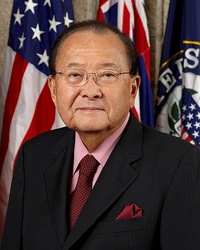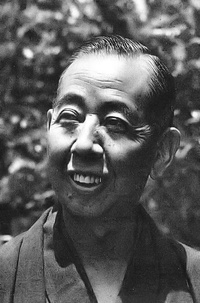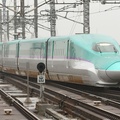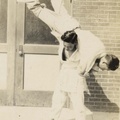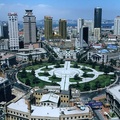A Japanese-American should become ambassador to Japan.
The first person to propose this to the Japanese government was the late Congressman Ken Inoue (Daniel Inouye). Congressman Inoue believed that having a Japanese-American serve as ambassador to Japan would not only benefit both the United States and Japan, but would also improve the status of Japanese-Americans in American society. The year was 1959, and the Japanese-American community was in the midst of a transition from the postwar reconstruction period to redress efforts.
Although the U.S. government has the power to select the ambassador to Japan, it cannot ignore the wishes of the Japanese government. So Senator Inoue met with Kishi Nobusuke, who was one of the most influential people in Japanese politics and the prime minister at the time, and proposed sending a Japanese-American to Tokyo as the ambassador to Japan.
Senator Inoue thought that the Japanese government would not oppose his proposal. However, Kishi flatly rejected his proposal. Furthermore, Kishi made an unexpected remark in front of Senator Inoue that could be taken as an insult to Japanese Americans.
In Japan, there are many descendants of distinguished samurai families, former aristocrats, and people related to the imperial family. They are now playing a leading role in society and the economy. Aren't you Japanese people "failures" who abandoned Japan because of poverty and other reasons? We cannot accept such people as ambassadors to Japan.
This statement was extremely humiliating for Senator Inoue.
Inoue tried to persuade Kishi further, emphasizing the benefits to Japan-U.S. relations as well as improving the status of Japanese Americans in American society by sending a Japanese American to Tokyo as an ambassador to Japan, but Kishi's attitude did not change. In the end, Inoue's dream of a Japanese American ambassador to Japan was crushed by the single hand of Kishi Nobusuke.
I think that Kishi's inability to understand the true intentions of Senator Inoue was a loss for both Japan and the United States. However, there were people in Japanese society at the time, like Kishi, who viewed those who left Japan to go overseas as so-called "abandoned people." In particular, there were many people like Kishi who held this view, especially among those considered to be of the "privileged class."
Moreover, and extremely unfortunate, I think Kishi didn't really care what Inoue's right half meant. 1 I think what concerned Kishi the most was "status." I think he emotionally could not accept the appointment of people who had abandoned their country and their children as ambassadors to a country where the leadership was held by so-called "high-status people," such as descendants of distinguished samurai families, and even members of the imperial family and former aristocracy. To put it another way, I think Kishi's discriminatory attitude toward immigrants is what crushed Inoue's proposal. 2
From the U.S. perspective, 1959 may have been a good time to appoint a Japanese-American as ambassador to Japan, but from Japan's perspective, it may have been premature for a Japanese-American to come to Japan as ambassador.
In fact, the Japanese government began to seriously tackle the issue of "status" and published the report of the Dowa Policy Council in 1965. And the so-called Dowa Policy Projects began in 1970. More than 20 years had passed since the new constitution came into effect.
When talking about history, "if only" and "but if" are not very welcome. The proposal to appoint a Japanese-American as ambassador to Japan has become an illusion, but if this proposal had been delayed even a few years, the circumstances surrounding U.S.-Japan relations may have been slightly different.
More than half a century has passed since Kishi crushed Inoue's proposal. Japanese society has become more diverse, and little by little, people from various backgrounds have come to be accepted into society.
And quite recently, in 2005, Seiko Luis Ishikawa was appointed Ambassador Extraordinary and Plenipotentiary of Venezuela to Japan, about 45 years after Senator Inoue tried to have a Japanese ambassador to Japan.
In the current Japanese government, Kishi's grandson, Shinzo Abe, was appointed Prime Minister and has set forth his own diplomatic theory, which he calls "Diplomacy that Perspectives the World Map," and is advocating the strengthening of "ties" with Japanese communities around the world in order to secure Japan's national interests. The primary objective of this policy is to increase Japan's presence in the international community, and I think there are many unknowns as to what direction this will take the relationship between Japanese people and Japanese people in the future.
Furthermore, regardless of the wishes of the Japanese government, the US government is likely to be very flexible in selecting its ambassador to Japan. The day when a Japanese American comes to Tokyo as an ambassador to Japan may actually come true in the near future. When that day comes, many Japanese people will warmly welcome a Japanese ambassador.
Note
1. During World War II, Senator Inoue served on the European front as a member of the 442nd Fighter Group, where he lost his right arm in fierce combat with enemy forces.
2. In 1959, when Inoue visited Kishi, the fact that then Crown Prince Akihito had married a commoner, Shoda Michiko, as Crown Princess became a major topic of conversation in Japanese society. While many Japanese welcomed the marriage, some members of the Imperial family and former aristocracy voiced strong opposition to welcoming someone who was not of the Imperial family or aristocracy into the Imperial family. In particular, Empress Nagako at the time expressed her displeasure with the marriage until just before her death, and her cold treatment of Michiko for many years was frequently reported in Japanese weekly photo magazines and women's magazines.
© 2014 Go Takamichi


